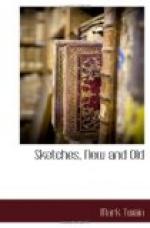“We improvised tables by propping up the backs of car-seats, and sat down with hearts full of gratitude to the finest supper that had blessed our vision for seven torturing days. How changed we were from what we had been a few short hours before! Hopeless, sad-eyed misery, hunger, feverish anxiety, desperation, then; thankfulness, serenity, joy too deep for utterance now. That I know was the cheeriest hour of my eventful life. The winds howled, and blew the snow wildly about our prison house, but they were powerless to distress us any more. I liked Harris. He might have been better done, perhaps, but I am free to say that no man ever agreed with me better than Harris, or afforded me so large a degree of satisfaction. Messick was very well, though rather high-flavored, but for genuine nutritiousness and delicacy of fiber, give me Harris. Messick had his good points—I will not attempt to deny it, nor do I wish to do it but he was no more fitted for breakfast than a mummy would be, sir—not a bit. Lean?—why, bless me!—and tough? Ah, he was very tough! You could not imagine it—you could never imagine anything like it.”
“Do you mean to tell me that—”
“Do not interrupt me, please. After breakfast we elected a man by the name of Walker, from Detroit, for supper. He was very good. I wrote his wife so afterward. He was worthy of all praise. I shall always remember Walker. He was a little rare, but very good. And then the next morning we had Morgan of Alabama for breakfast. He was one of the finest men I ever sat down to handsome, educated, refined, spoke several languages fluently a perfect gentleman he was a perfect gentleman, and singularly juicy. For supper we had that Oregon patriarch, and he was a fraud, there is no question about it—old, scraggy, tough, nobody can picture the reality. I finally said, gentlemen, you can do as you like, but I will wait for another election. And Grimes of Illinois said, ’Gentlemen, I will wait also. When you elect a man that has something to recommend him, I shall be glad to join you again.’ It soon became evident that there was general dissatisfaction with Davis of Oregon, and so, to preserve the good will that had prevailed so pleasantly since we had had Harris, an election was called, and the result of it was that Baker of Georgia was chosen. He was splendid! Well, well—after that we had Doolittle, and Hawkins, and McElroy (there was some complaint about McElroy, because he was uncommonly short and thin), and Penrod, and two Smiths, and Bailey (Bailey had a wooden leg, which was clear loss, but he was otherwise good), and an Indian boy, and an organ-grinder, and a gentleman by the name of Buckminster—a poor stick of a vagabond that wasn’t any good for company and no account for breakfast. We were glad we got him elected before relief came.”
“And so the blessed relief did come at last?”
“Yes, it came one bright, sunny morning, just after election. John Murphy was the choice, and there never was a better, I am willing to testify; but John Murphy came home with us, in the train that came to succor us, and lived to marry the widow Harris—”




